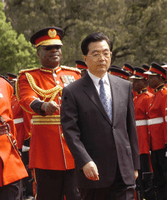Several analysts have noted that China is leveraging the global financial crisis to increase its economic clout -- for example, by going on a commodities "shopping spree," contributing $40 billion to the International Monetary Fund at the G-20 summit, and pushing for a greater voice in reforming international economic institutions. Recent developments, however, suggest that it is going further. China is using the crisis to step back and consider how it can rise in a more sustainable manner. That move is borne not only of its desire to be a world power, but also of its recognition that its strategy of roughly the past three decades -- grow rapidly, worry about the socioeconomic consequences later -- is no longer viable. Three developments merit particular attention: 1. China has decided to scale back its investments in Congo and Guinea in response to political instability there. Sino-African relations in recent years have followed a simple pattern: in exchange for building infrastructure in a given African country, China would receive commodities -- minerals and oil, in particular -- that it needed for its burgeoning economy. China would set up shop in even highly unstable countries if lucrative investment opportunities presented themselves.
Signs of Strategic Recalibration in China

